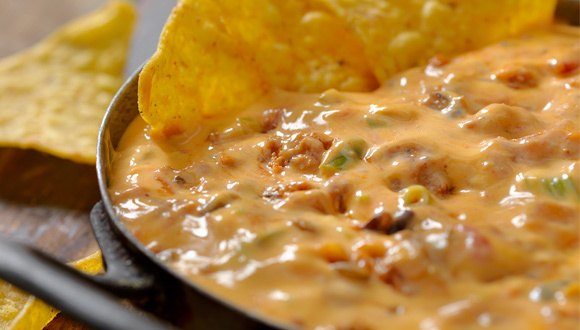We. Love. Cheese. From cubed to shredded to melted to string and from Cheddar to Blue to Swiss to Nacho, there's a variety for every palate.
We'll dip just about any salty carb into it. We top burger patties, salads and casseroles with it. When the moment calls for a bit more sophistication, we pair it with cured meats, nuts and fruit and turn the whole thing into an edible exhibition. We even sneak cheese into some desserts as a secret ingredient.
No matter how you slice it, cheese goes with just about anything. And we take full advantage of that.
But is there a more nefarious reason cheese has become a staple in many of our diets? Could there actually Brie a problem when it comes to our obsession with cheese?
In other words, might cheese be addictive?
Some popular articles out there that would have you believe as much. But it's time to give this claim the smell test.
Cheese addiction: Is it real?
It certainly feels as if cheese might be addictive. "Would you like cheese on that?" is an offer difficult to turn down. Cheese makes everything tastier — even things that already taste good.
But "addiction" is a serious word, not to be taken lightly. The American Society of Addiction Medication defines it as a medical condition involving complex interactions between your brain, body, environment and even your genetics. Addiction manifests as a compulsive behavior that a person finds hard to resist despite knowing its harmful consequences. There are also often symptoms of withdrawal when discontinuing an addictive behavior.
So can eating cheese really become an addiction?
No. There's no scientific evidence that cheese is addictive or that it significantly affects the brain similar to drugs or alcohol.
That's not to say that eating cheese can't affect your brain's reward center, which may even cause you to crave it from time to time. But food cravings aren't the same as addictions. And they're also not specific to cheese.
What caused the meltdown about cheese?
Where did this myth about cheese being addictive come from?
The narrative seemed to start with a 2015 study that investigated whether certain foods are associated with "addictive-like" eating behaviors. And, you guessed it, cheese was one of the foods examined.
Participants were asked to self-report on their "addictive-like" eating behaviors. In short, they were asked to make decisions about how "problematic" they found certain foods, which was defined as "having trouble cutting down on the food or losing control over how much of the food you eat."
The study found that not all foods are associated with self-reported "addictive-like" eating behaviors. Unsurprisingly, highly processed foods (like french fries and cookies) were most frequently reported as problematic, while less processed foods (like cucumbers and beans) weren't.
Where did cheese fall in this list of problematic foods?
The data was sliced a few different ways, but cheese itself was reported to be less problematic than chocolate, ice cream, fries, pizza, cookies, chips, cake, cheeseburgers, popcorn, muffins, breakfast cereals, gummy candy, fried chicken, rolls and soda. (We know, we know — pizza and cheeseburgers contain cheese. But they also contain other refined fats and carbohydrates, making it impossible to place all the blame on the cheese alone.)
Interestingly, while this study might be the origin of the cheese-is-addictive confusion, the study didn't actually suggest cheese itself is addictive. The subsequent press releases and news outlets covering the study, however, did make this inaccurate leap. Cue the meltdown about cheese.
The last thing to know is that the concept of "food addiction" itself is still heavily debated. Some say that it isn't supported by scientific evidence, and that the characteristic features of addiction aren't seen with eating behaviors. Others disagree, though, arguing that "food addicts" struggle with tendencies that share similar features to known addictive behaviors.
Queso, are cheese cravings real at least?
Cheese addiction isn't proven, but there may be another explanation as to why many of us have trouble resisting cheese. As mentioned, food cravings are entirely possible.
For starters, the act of eating itself — especially if you're eating something tasty, like queso — is an inherently satisfying behavior. And our brains are hardwired to encourage and ritualize behaviors that provide pleasure, even if this pleasure is only perceived. This means that the reason we may sometimes crave cheese could be as simple as the "food euphoria" we feel when eating it.
What's more, research shows that certain foods can actually activate the reward centers in our brains, invoking positive feelings that encourage us to come back for more and more. These are referred to as "highly palatable foods" and generally include those that contain high amounts of added sugar, saturated fat, carbohydrates or salt.
With its fatty-salty attributes, it's no coincidence, then, that cheese might be considered a craveable food.
And some even go as far to speculate that the milk protein found in cheese, called casein, may stimulate cheese cravings. During digestion, casein is broken down into casomorphins, which are thought to have an opiate-like effect. However, no studies show that the amount of casomorphins found in cheese actually elicit effects on the reward center in the human brain.
Explanations of why exactly we put cheese on literally everything aside, there's probably nothing to worry about as long as you're eating it in moderation. Cheese can be high in saturated fat and salt, but it also contains calcium and important vitamins and minerals. It may be craveable, so you do need to mind how much of it you eat, but there's no evidence it's actually addictive.


